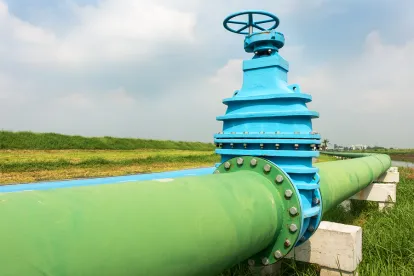PHMSA announces meetings on pipeline safety issues. PHMSA clarifies the Gas Transmission Final Rule. Updated PHMSA Rulemakings Chart. PHMSA announces Safety Research and Development Forum. PHMSA announces minimum annual percentage rate for random drug testing. DOT Inspector General identifies key challenges facing PHMSA in 2020. API updates Recommended Practice addressing safety and environmental management systems for offshore operations and assets. API updates guidance for determining the operational status of pipelines. Updates from Select States
PHMSA Announces Meetings on Pipeline Safety Issues
The Pipeline and Hazardous Materials Safety Administration (PHMSA) has announced that it will convene a series of public meetings on February 25-27 to address several pipeline safety issues. The meetings will be held in Sugarland, Texas. An agenda is here.
Operators Meeting, February 25: PHMSA will convene a 1-day meeting with operators of pipeline and LNG facilities to discuss, among other things, how PHMSA develops its annual inspection plans, how each system-specific inspection protocol is created, the agency’s general enforcement processes, and lessons learned from incidents and accidents. PHMSA plans to answer questions, address operator concerns and provide an opportunity to speak with PHMSA outside the inspection environment. Participation is restricted to operators and attendance is limited to 350 people. The meeting will not be webcast. The registration deadline is February 12. Additional information is here.
Implementing the Gas Transmission and Hazardous Liquid Final Rules, February 26-27: PHMSA will convene meetings on implementing the Gas Transmission Final Rule and the Hazardous Liquid Pipeline Final Rule that were issued on October 1, 2019. PHMSA has released draft frequently asked questions (Gas FAQs and Hazardous Liquid Pipeline FAQs) with draft answers to guide implementation of both final rules. PHMSA requests comments on the drafts by February 11, 2020 to facilitate discussion at the meeting. The public comment period on the FAQs will remain open until March 27, 2020. The meeting on the Liquid Pipeline Rule will be held on February 26 and the meeting on the Gas Transmission Rule will be held on February 27. Both meetings will be webcast. Registration information is here.
PHMSA Clarifies Gas Transmission Final Rule
On December 20, 2019, PHMSA issued a letter granting the American Gas Association’s (AGA) petition for reconsideration of the Gas Transmission Final Rule issued in October 2019. PHMSA’s clarifications are described below. PHMSA plans to publish the letter in the Federal Register.
Record-keeping for Class Location Determinations. PHMSA clarified that the recordkeeping requirements set forth in new § 192.5(d), which requires an operator retain documentation of current class location determinations and records demonstrating how each class location was determined, applies only to gas transmission pipelines.
Applicability of MAOP Reconfirmation Requirements. Under new § 192.624, an operator must reconfirm the MAOP of an onshore gas transmission pipeline segment under certain circumstances, including if the operator does not have traceable, verifiable, and complete records supporting the calculation of MAOP of a pipeline segment that is located in a high consequence area (HCA) or a Class 3 or Class 4 location. PHMSA’s clarification provides that an operator is not required to reconfirm MAOP if the operator has pressure test records that are traceable, verifiable, and complete.
Updated PHMSA Rulemakings Chart. The chart below shows the status of PHMSA’s pending pipeline safety rulemakings as reflected in (1) the Department of Transportation’s (DOT) August Significant Rulemaking Report, (2) PHMSA’s status Chart of legislatively mandated actions, and (3) the Office of Management & Budget’s (OMB) Office of Information and Regulatory Affairs (OIRA) Fall 2019 Unified Agenda of Regulatory and Deregulatory Actions. The Unified Agenda appears in two principal parts, Current Agenda Agency Regulatory Entries for Active Actions and Current Long Term Actions.
Pending Final Rules
|
Proceeding |
DOT Estimated Publication |
OIRA Estimated Publication |
PHMSA’s Chart |
|
Emergency Order Procedures |
Issued October 1, 2019 |
||
|
Safety of Gas Transmission Pipelines, MAOP Reconfirmation, Expansion of Assessment Requirements and Other Related Amendments |
Issued October 1, 2019 |
||
|
Safety of Gas Transmission Pipelines, Repair Criteria, Integrity Management Improvements, Cathodic Protection, Management of Change, and Other Related Amendments |
December 20, 2019 |
March 2020 |
Not Listed |
|
Safety of Gas Gathering Pipelines |
June 26, 2020 |
June 2020 |
Not Listed |
|
Safety of Onshore Hazardous Liquid Pipelines |
Issued October 1, 2019 |
||
| Underground Natural gas Storage Facilities | This Final Rule has been transmitted to the Federal Register for publication.. | ||
Pending Notices of Proposed Rulemakings
|
Proceeding |
DOT Estimated Publication |
OIRA Estimated Publication |
PHMSA’s Chart |
|
Amendments to LNG Facilities |
September 2, 2019 |
January 2020 |
January 20, 2020 |
|
Class Location Requirements |
November 15, 2019 |
April 2020 |
Not Listed |
|
Gas Pipeline Regulatory Reform |
October 15, 2019 |
January 2020 |
Not Listed |
|
Liquid Pipeline Regulatory Reform |
Not Listed |
November 2019 |
Not Listed |
|
Periodic Standards Update |
Not Listed |
December 2020 |
Not Listed |
|
Repair Criteria for Hazardous Liquid Pipelines |
June 26, 2020 |
June 2020 |
Not Listed |
|
Valve Installation and Minimum Rupture Detection Standards |
September 27, 2019 |
November 2019 |
September 27, 2019 |
Pending Advance Notices of Proposed Rulemakings
|
Proceeding |
DOT Estimated Publication |
OIRA Estimated Publication |
PHMSA’s Chart |
|
Coastal Ecological Unusually Sensitive Areas |
Not Listed |
December 2020 |
April 13, 2020 |
Other PHMSA Updates
PHMSA announces Safety Research and Development Forum. On January 30, PHMSA issued a notice that it will convene a Safety Research and Development Forum on February 19-20 in Arlington, Virginia. The forum enables the public, government and industry pipeline stakeholders to develop recommendations on the technical gaps and challenges for future pipeline safety research. Specifically, the forum identifies key pipeline technical challenges facing industry and government; disseminates information on current research efforts; and identifies new research that can help to meet known challenges. The agenda and additional information is here.
PHMSA announces minimum annual percentage rate for random drug testing. On December 30, 2019 PHMSA issued a notice announcing that the minimum annual percentage rate for random drug testing of covered employees will remain at 50 percent for 2020. PHMSA also reminded operators to report drug and alcohol data for contractors to the Management Information System (MIS)
Updates from Other Federal Agencies
DOT Inspector General identifies key challenges facing PHMSA in 2020. On October 23, 2019, DOT’s Office of the Inspector General (OIG) published its “Top Management Challenges for Fiscal Year 2020.” OIG noted that since 2017, PHMSA had improved its workforce management plans, but faces challenges in hiring and retaining a highly qualified workforce to oversee the safety of pipeline and LNG facilities. In addition, OIG stated that PHMSA’s internal policies impede the referral of potential criminal violations of the Pipeline Safety Act to OIG for investigation.
Updates from Industry
API updates Recommended Practice addressing safety and environmental management systems for offshore operations and assets. On December 4, 2019, the American Petroleum Institute (API) released an update to API Recommended Practice 75, “Safety and Environmental Management System for Offshore Operations and Assets,” which describes the elements of a Safety and Environmental Management System (SEMS) for offshore oil and gas operations. According to API, the updated API RP 75 reflects an improved approach to the systematic management of safety and environmental performance based on technological advancements, changed operations, and better understanding of management systems and human performance.
API updates guidance for determining the operational status of pipelines. API recently released an update to Recommended Practice 1181, “Pipeline Operational Status Determination,” which provides guidance to pipeline operators regarding the inspection and maintenance activities that must be performed on the pipeline based on whether the pipeline is active (i.e., in-service), idled, or abandoned.
Updates from Select States
Oklahoma: On January 22, 2020, the Transportation Division of the Oklahoma Corporation Commission (OCC) issued a Notice of Proposed Rulemaking recommending that the OCC amend the state’s Gas and Hazardous Liquid Pipeline Safety Rules. The proposal would (1) adopt Part 191 (Gas Reporting), Part 192 (Gas Pipeline Safety Standards), Part 195 (Hazardous Liquid Pipeline Safety Standards), and Part 199 (Drug and Alcohol Testing) as they exist on January 1, 2020 with respect to intrastate pipeline and underground storage facilities; (2) expand the requirement to submit plans, specifications, maps, and other data to include underground natural gas facilities; and (3) update references to the Oklahoma Underground Facilities Damage Prevention Act. The Transportation Division will convene a technical conference on February 18, 2020 and a public hearing on March 10, 2020. Comments are due February 28, 2020.
Texas: On January 3, the Texas Railroad Commission (RRC) published a number of amendments to its regulations governing pipeline safety (Chapter 8) and regulations governing pipeline permits for production and flow lines (Chapter 3). The new regulations became effective January 6. Below is an overview of several of the new provisions:
Gathering pipelines. Significantly, reflecting the authority granted in 2013 by House Bill 2982, the amended regulations impose new requirements on gas gathering pipelines in Class 1 locations and on hazardous liquid gathering and carbon dioxide (CO2) gathering pipelines in rural areas. Operators of these facilities will be required to (1) use processes and technologies that are technically feasible, reasonable and practicable to correct hazardous conditions that create risks to public safety; (2) submit incident and accident reports; (3) except for hazardous liquid and CO2 pipelines located in rural areas, telephonically report incidents no later than 1 hour after confirmed discovery; (4) investigate incidents and accidents and cooperate with the RRC with respect to such investigations; and (5) comply with any RRC requirement to submit a corrective action plan to remediate an incident, accident, or other hazardous condition that creates a risk to public safety or to address a complaint related to public safety.
Distribution Pipe Replacement. To implement a statutory requirement, § 8.209(h) is amended to require that operators of gas distribution pipelines annually remove 8% (instead of 5%) of underground gas distribution pipeline posing the greatest risk. In addition, all cast iron pipe must be replaced by December 31, 2121.
Amended Telephonic Reporting of Incidents: To align with federal requirements, amended § 8.210 and § 8.301 require pipeline operators to submit a telephonic report of an incident or accident within 1 hour of confirmed discovery. Gas distribution operators are subject to additional reporting requirements. Operators are not required to submit written incident or accident reports to the RRC, but records of reports must be retained perpetually.
Adopts Federal Standard. Section 8.1(b) adopts the Federal pipeline safety standards in effect through January 22, 2019, including new plastic pipe regulations.
Integrity management. The requirement for approval to use direct assessment is deleted from § 8.101 because of the issuance of a new National Association of Corrosion Engineers (NACE) standard addressing direct assessment.
Notification of Construction. Section 8.115 contains amended time periods for notifying the RRC of the construction of pipelines and other facilities.







 />i
/>i
